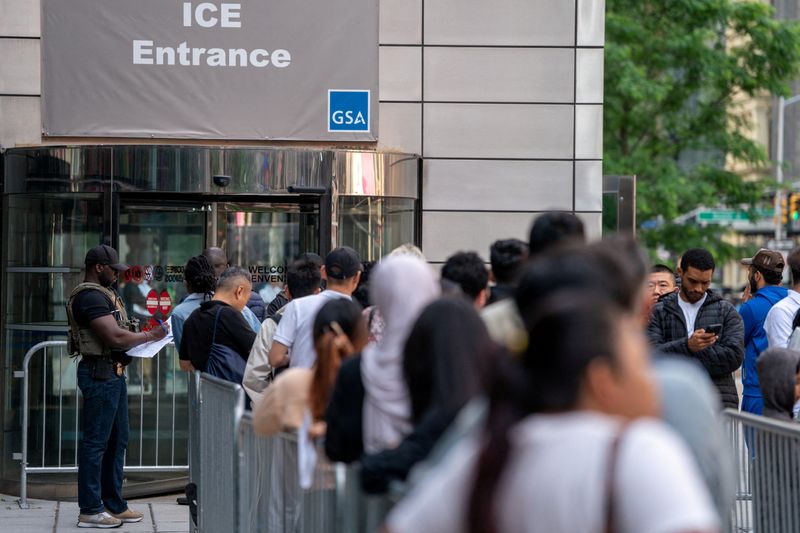US Judge Blocks Trump Administration’s Expansion of Fast-Track Deportations, Citing Due Process Violations
Washington, D.C. – August 29, 2025 – In a significant blow to the Trump administration’s aggressive immigration enforcement agenda, a federal judge issued an order on Friday halting two key policies designed to broaden the use of expedited removals nationwide. U.S. District Judge Jia Cobb ruled that the expansions violate the constitutional due process rights of migrants under the Fifth Amendment, potentially affecting millions of non-citizens who could face rapid deportation without judicial oversight.
The decision came in a lawsuit filed by Make the Road New York, an immigrant rights organization represented by the American Civil Liberties Union (ACLU). The group challenged policies adopted by the Trump administration in January, shortly after President Donald Trump’s inauguration for his second term. These measures extended the expedited removal process—traditionally limited to migrants caught near the border—to apply to any non-citizen apprehended anywhere in the United States who cannot prove they have been in the country for at least two years. This expansion exposes an estimated millions of individuals to swift expulsion without a hearing before an immigration judge.
Expedited removal, established under a 1996 law, has long been a tool for quickly deporting individuals intercepted within 100 miles of the U.S. border and shortly after entry. The Trump administration’s January directives mirrored a similar nationwide expansion attempted during Trump’s first term in 2019, which was later rescinded by the Biden administration amid legal challenges. Judge Cobb noted that immigration authorities have employed the new powers “aggressively” in recent months, including during workplace raids and arrests at immigration courts, creating a “significant risk” that eligible individuals for asylum or other relief could be erroneously removed.
Due Process Concerns at the Core of the Ruling
In her detailed opinion, Judge Cobb described the process as “skimpy” and inadequate for migrants who have established lives in the U.S. “They have a weighty liberty interest in remaining here,” she wrote, emphasizing that unlike recent border crossers, those targeted by the expansion have been in the country longer and deserve fuller procedural protections. The ruling applies nationwide and takes effect immediately, suspending the policies until the litigation concludes. Cobb rejected the administration’s request for a two-week stay to appeal, underscoring the urgency due to ongoing enforcement actions.
This marks the second recent setback for the administration in Cobb’s court. Earlier this month, she blocked efforts to fast-track deportations of hundreds of thousands of immigrants admitted under Biden-era humanitarian parole programs, ruling that the Department of Homeland Security (DHS) exceeded its statutory authority. That decision highlighted similar concerns about “fair play” for those fleeing oppression, with Cobb questioning whether the U.S. system would allow them to “plead their case” or subject them to summary removal reminiscent of the dangers they escaped.
A DHS official responded sharply to Friday’s ruling, stating it “ignored Trump’s legal authority” and that the president “has a mandate to arrest and deport the worst of the worst.” The ACLU did not immediately comment, but advocates hailed the decision as a vital protection against overreach. “This is about ensuring due process for people who followed the rules to enter and build lives here,” said one immigration attorney involved in related cases.
Broader Context of Trump’s Immigration Crackdown
The halted policies are part of a sweeping immigration overhaul promised during Trump’s 2024 campaign, aimed at ramping up deportations to historic levels. Since January, the administration has invoked measures like the Alien Enemies Act for targeted removals of alleged gang members and expanded enforcement through ICE workplace raids. However, these efforts have faced repeated judicial hurdles. In March, U.S. District Judge Brian Murphy in Boston issued a temporary restraining order blocking rapid deportations to third countries without opportunities to raise persecution fears, citing risks under the Convention Against Torture. The administration appealed that decision, arguing it usurps executive power on national security matters.
Critics, including immigrant rights groups, argue the expansions undermine asylum rights and expose vulnerable populations to erroneous deportations. Supporters, including Trump allies, contend they are essential for border security and public safety, pointing to the administration’s claims of deporting “criminal aliens.” The ruling could prompt an appeal to higher courts, potentially reaching the Supreme Court, where the conservative majority has previously sided with the administration on immigration issues.
Social media reactions have been swift and polarized. On X (formerly Twitter), Reuters’ post on the ruling garnered thousands of views, with users debating its implications for Trump’s agenda. One thread highlighted the decision’s role in checking executive overreach, while others criticized it as judicial activism hindering enforcement. As the case progresses, it underscores ongoing tensions between the branches of government over immigration policy in Trump’s second term.
This development comes amid a surge in migration challenges, with U.S. authorities reporting increased encounters at the border. The administration’s broader strategy includes tightening visa durations for students and media, further signaling a hardline stance. For now, the halt provides temporary relief to affected communities, but the legal battle is far from over.
Sources: Reuters, NBC News, AP News, Politico, Hindustan Times, X Posts
